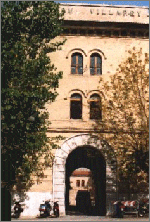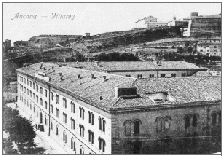A brief history
|
The "Faculty of Economics and Commerce" was originally set up in Ancona in 1959 as a branch of the University of Urbino, which dates back to the late medieval period. The new Faculty soon achieved national renown on account of its innovative study programmes, the quality of its teaching staff, mostly brilliant young professors from the more established National Universities and the wide scope of if its research endeavours. Paramount in the development of the new Faculty was Prof. Giorgio Fuà, a young economist who had worked with Gunnar Myrdal at the UN and later with Enrico Mattei at ENI (the state owned petroleum company). A native of Ancona, Prof. Fuà decided to come back to his hometown, to devote his intellectual and organisational abilities to the forwarding of the newly established Faculty. In their respective fields of interest (whether economic, sociological, managerial etc) the Ancona scholars have always endeavoured to analyse the problems of the Italian economy and society, in the shared belief that each country’s development follows a specific pattern that is shaped by its cultural and social heritage. The characteristics of Italy's long term development, the dualism of its labour market, the emergence of the Italian industrial districts and their relation with the civic values of the north-east and central regions of the country are among the achievements that have contributed to the recognition of the Faculty’s research within and outside Italy. From this first hand knowledge of the rapidly evolving needs of the country stems the attention that the Faculty has always devoted to the academic programmes, often anticipating the lines of the national reforms. Back in 1963, at a time when the study programme of all the Italian Faculties of Economics was still rigidly set by a 1938 royal decree, the young Faculty came to the national attention for a bold reform of its curricula. Considering that the advancements in economic theory and business techniques, together with the pace of industrialisation of the country required diversified and more finalised study programmes the Faculty set up two majors, one in Business and one in Economics. Technically this was made possible by duplicating some courses of third and fourth year which, under the same name, offered different syllabus. Students were invited to choose one of the two majors and, upon graduation, ask the Faculty for a statement of the major they had followed. Again in 1968 the Faculty carried out a deep restructuring of its study programmes that was de facto sanctioned later by the national reform law of 1969. In 1982, the Faculty of Economics joined the more recently established (1969) University of Ancona (now UNIVPM). In the same year the Italian Ministry of Education allowed a limited number of universities to set-up doctoral programmes. The "Doctoral Programme in Economics” established by the Department of Economics soon became one of the country’s leading centres for the formation of young economists, as is proved by the number of doctoral scholarships granted by the Ministry (seven per year between 1985 and 1998, the largest in this specific field), the diversity of students’ academic backgrounds and the career achievements of its graduates. Today the programme is funded by the University and it is open to both Italian and international students, together with the other doctoral programmes set up in the meantime. True to its tradition, the Faculty has been in the forefront in the application of the 2001 reform law that restructured the Italian university degrees along the lines of the Bologna Declaration. With the new structure of degrees, the recently acquired location and the widening scope of its international programmes the Faculty, renamed Giorgio Fuà after its founder and leading figure for more than 40 years, is ready to meet the challenges of European integration and international co-operation. |
 |


